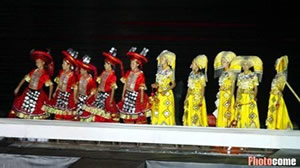 |
| Liu
Sanjie (played by Wang Wanqiu) in the movie |
Liu
Sanjie
(The Third Sister of the Liu Family) is a legend of the Zhuang people.
Zhuang is one of the 56 ethnic groups in China and, with a population
of 15 million, is second only to the Han people, who account for more
than 91 percent of the nation's total population of 1.3 billion.
The story of Liu Sanjie became known throughout the country thanks to
an eponymic movie, produced in color in 1961. An instant hit, the movie
also helped spread the legend to the entire Southeast Asia.
The Zhuang
people believe that the legendary Liu Sanjie actually existed. The Middle
Jian Village on the Lower Jian River at the foot of the Lower Jian Mountain
in the Yizhou Town of Guangxi Autonomous Region professes to be her birthplace.
Her original name is said to be Liu Shanhua. Since she was the third child
of her family, she was given the nickname of "Liu Sanjie," meaning
"Sister No. 3 of the Liu Family." An incarnation of a lark,
as the Zhuang people so believe, Sanjie started speaking eloquently when
she was only one. At the age of three, she already had a melodious voice.
In her teens, she was regarded as the top singer of folk songs—songs
in an antiphonal style, typical of the ethnic people in South China. Coveting
her beauty and talent, a local tyrant named Mo Huairen wanted to have
her as his concubine. Rejected, the angry Mo plotted to murder her. With
the help of her boy friend and fellow villagers, she managed to escape.
The two lovers traveled as they sang, and eventually found their ultimate
freedom by turning themselves into a pair of larks.
Today, the
people of Yizhou Town claim that they still possess some of her relics,
such as a shoulder pole in the crevice of a cliff, a spot she frequented
to do her laundry , and a site where she purportedly beat the local despot
and his hired singers in a dramatic song contest.
The legend
of Liu Sanjie was originally an oral tradition and later found itself
in romance, drama scripts, and county annals in Guangxi. Studies show
that the legend is not exclusively of the Zhuang people. Its spread turns
out to be more ethnically and geographically diversified. For, similar
stories can be found among the Miao, Yao, Buyi, Mulao and Han ethnic populations
in Guangdong, Hunan, Yuannan and Guizhou provinces as well.
A melodious
song breaks the silence of a serene morning on a green river. The song
comes from a young girl on a fishing boat. She is Liu Sanjie or The Third
Sister of the Liu Family. Orphaned at an early age, she was raised by
her brother Liu Er, honest but meek. Sanjie is a girl of beauty, intelligence,
and courage. She is well-known for using her singing talent to celebrate
freedom and honesty while castigating abuse and injustice. Therefore she
is cherished by the common people but hated by those lording over them.
She has just been involved in a singing duel with a local despot where
she and her brother lived miles away. The despot suffered an heart attack
and died during the confrontation where Sanjie relentlessly chastised
him for his villainy. Blaming his death on Sanjie, the tyrant's family
bribed the local authorities in the hope of having her pay for his life.
Sanjie and her brother Liu Er are now on their way to their grandma’s
home to seek refuge.
The time
she and her brother set foot on their grandmother's village, Liu Sanjie
encounters a bully looting a hunter. The bully is Mo Fu, a henchman of
a local tyrant named Mo Huairen. She also witnesses a young man trying
to reason with the henchman. When challenged to a physical fight, the
young man simply threw him to the ground. Liu Sanjie learned that the
young man's name is Li Xiaoniu and felt drawn to him. As Liu Sanjie and
the others are amused at the embarrassed and exasperate henchman, there
comes Mo Huiren's butler Mo Jincai. Branding his fist at the hunter, Mo
Jincai fumes: “Since every single blade of the grass and every single
twig of the trees on this mountain belong to my master Mo Huairen, he
certainly owns whatever you catch! If you dare to challenge my authority,
I will have him bar you from hunting at all!” Liu Sanjie can no
longer restrain her indignation and begins to chastise the bullies with
her song:
 |
| A post-modern
rendition of Liu Sanjie in Guangxi |
....
When the
day comes for the contest, all the villagers turn out. Mo Huairen has
hired three pedants, who claim to know all the songs in the world. The
books they brought with them fill an entire boat. Knowing that their opponent
is but a country girl, they are more than confident about their victory.
Equally confident,
Liu Sanjie starts the contest by singing:
“No
matter how much you've read,
If you can glide, then I can wing;
A wasp hovering above a tortoise head,
Dare you stick it out and I will sting."
 |
| Scenes of the
Lijiang River in Guangxi |
After a few
rounds, the pedants begin to know the girl's strength, but they won't
take it lying down. Racking their brains and leafing through their books,
they are looking frantically for a song that they hope can help them turn
the table. Eventually, one of them seems to have found a lifesaver:
“Tell
us , you smart girl, without delay:
How many nails you can find on our boat,
How much the mountains yonder weigh,
How many grains there are in a basket of oat.”
Liu Sanjie
answers effortlessly:
....
Knowing that
Mo Huairen will surely get the magistrate’s support and attempt
at Liu Sanjie’s life, the villagers urge her to keep herself from
harm’s way for the time being. Liu Sanjie says goodbye to them and
embarks on her journey with her lover Li Xiaoniu. Liu Sanjie leaves a
trail of her songs wherever she travels. In no time, they spread all over
the region where the Zhuang people live.
Story
retold/ translated by Haiwang Yuan, ©2004
Last updated: September 10, 2008 |